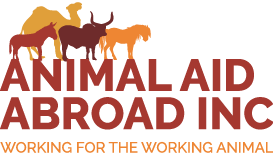ZWDP Oct Update: 111 Donkeys Given Care, Addressing Abuse and Health Challenges
In October, ZWDP made an incredible impact in our mission to support and care for donkeys, treating a total of 111 donkeys from the field and 16 at their sanctuary.
This month highlights the importance of our care for animals and their welfare, especially as we confronted the heartbreaking realities of abuse and health challenges faced by vulnerable working animals. With our supporters' help, ZWDP was able to provide essential care, treatment and compassion for donkeys.
These treatments included internal and external parasite control, as well as treatment for tick-borne diseases and fly-bite dermatitis. Seven donkeys received basic wound treatment, and the team successfully met its target of replacing ox yokes with humane harnesses, achieving a total of seven replacements. The month concluded with 14 donkeys currently in care at the sanctuary.
This month served as a reminder of how vulnerable donkeys are to abuse, especially during the drought season. Tragically, a donkey named Wisdom from Kafekwa village was attacked by a known suspect after he ate from a vegetable patch believed to belong to the perpetrator.
The injury resulted in a complete fracture of Wisdom’s left lower hind limb. His owner brought him to ZWDP on a cart and the team was saddened to inform the owner that the best way to show compassion for Wisdom was to euthanise him. Witnessing Wisdom in pain was heartbreakin, and there was relief when the owner finally consented to put him to sleep, alleviating his suffering. Wisdom’s owner is seeking justice and the case is currently under police investigation.
One limitation in ZWDP’s animal healthcare efforts has been the lack of diagnostic equipment, often resulting in symptomatic treatments for donkeys with unknown or undiagnosed ailments.
Thankfully, with the assistance of relevant stakeholders, it was determined that one of their rescues, Kamuseka, has been anaemic due to a tick-borne infection. The blood parasites identified are primarily transmitted by ticks but can also be mechanically transmitted by other means, including biting insects like flies.
At Maramba Farm, ZWDP routinely conducts dipping as a preventive measure against tick-borne diseases, and the team employs fly control methods to further reduce the risk of vector-borne disease transmission. Donkeys are often chronically infected with tick-borne diseases, and symptoms are not always apparent. Thanks to these laboratory findings, a treatment plan was successfully implemented.
Some good news, Budget and Central, the latest rescues, were returned to their owners this month. Based on ZWDP’s guidance regarding penalties for the mistreatment or abuse of working animals, the owner received a verbal warning as a first-time offender and the case was documented with the senior headman.
As we reflect on the month, we are reminded of the resilience of the donkeys we serve and the ongoing challenges they face. We are so thankful to our supporters, whose contributions enable us to continue our work with ZWDP, ensuring animals are treated with kindness.
Together, we are making a meaningful difference in the lives of donkeys, providing them with care and compassion. Thank you for standing with us in our mission to advocate for animals.









